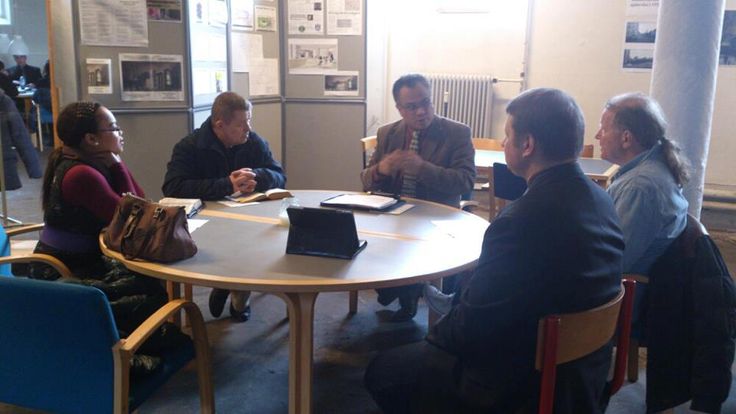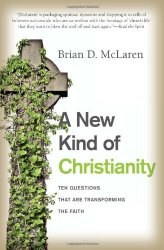Idea #21: Why Reading the Bible in Community with Other People is So Valuable
Bible reading doesn’t have to be exclusively an individual habit of personal devotions. Reading the Bible in community has many valuable benefits that enriches your experience of the life-changing message of the Bible. Here’s why you should consider reading the Bible with a group of people:
See the Bible as a story instead of a rulebook
“Reading whole books of the Bible–instead of just little snippets or verses like we usually do–helped people to see the epic narrative of Scripture. Once they saw the Bible as a story instead of a rulebook, they were hooked.” — Pastor Peter Yoshonis, Spring Lake Wesleyan Church, Michigan via mnnonline.org/news/bible-reading-campaign
Allows everyone to ask questions and share insights
“Reading the Bible in community allows everyone to ask questions or reflect on surprises and truths found in the experience.” — Paul Caminiti, Vice President of Bible Engagement for Biblica via mnnonline.org/news/bible-reading-campaign
A support system for reading the Bible more authentically, more effectively, and more fun
… not only is Bible-reading much richer in community with other people, it’s actually more accurate! Left to interpret the Bible in the privacy of our own hearts, we are likely to get it wrong. The Bible is meant to be read and understood in community. It’s more authentic that way, more effective, and more fun, and it’s far more likely to actually happen—because of the natural accountability a support system provides. — Melanie Jongsma in 3 reasons Christians don’t read the Bible
Deeper and Wider Understanding of the Scriptures
Our culture lenses shape our worldview, our relationships, our behavior … even the way we read the Bible. … The best way to discover cultural lenses is to read the Bible in a diverse community. Your background, experiences, journey through life—really, everything about you—have positioned you to read God’s Word uniquely. In other words, your unique lenses, through which you read the Bible, are gifts from God. The rest of us need your lenses. Much dysfunction in the Christian community stems from our failure to look at God’s Word through the diverse set of lenses he’s given us in each other. When we cluster around people who only share our lenses, we miss important things. — Reading the Bible with a Diverse Community, Steve Tamayo at the Blog of InterVarsity Christian Fellowship

(photo credit: esperanzatolentino.wordpress.com)
How to Read the Bible in Community
Biblica produced the Community Bible Experience as a campaign for groups to read the entire New Testament in 40 days, providing a printed Bible without chapter and verse, restoring the text to a more original presentation, helping readers to see Scripture in its context and beauty. To promote the Community Bible Experience, they’ve created this website at 40daybible.com to provide all the resources needed for a church to go through this Bible engagement program by having small groups meeting together like a book club rather than a traditional Bible study.
Community Bible Reading’s website at joincbr.com was developed at Trinity Presbyterian Church in Lakeland, Florida and has provided a Bible reading program since 2005 that encourages people to develop a habit of and a love for Bible reading to read, meditate on, journal about, and discuss the Bible with family and friends.
Community Bible Study started in the 1970s with a group of women who prayed that the Lord would provide Bible studies for people in the Washington, D.C. area. Without any advertising, publicity, or human planning, classes spread like wild fire. Currently, about 700 classes are actively gathering throughout the United States and in over 70 countries internationally with study materials translated in over 50 languages.
Brian McLaren, author of A New Kind of Christianity: Ten Questions That are Transforming the Faith, described in an article titled A New Kind of Bible Reading about the importance of reading the Bible in community —
Reading the Bible conversationally
If a culture is a community of people who converse (or argue) about the same things across many generations, it makes sense to learn the contours of the main players in the conversation. For example, in the gospels, Jesus enters ongoing conversations among Pharisees, Sadducees, Zealots, Herodians, priests, scribes, prophets, Roman authorities, excluded sinners, and the poor. Across the Hebrew Bible, there is a persistent tension between priests (who are the institutional caretakers of what we might call “organized religion”) and prophets (movement leaders who critique the very status quo of ritual and sacrifice that the priests work so hard to defend from the forces of chaos and compromise). There is a tradition that celebrates the monarchy and another tradition that deplores and laments it. There is a tradition that sees order and justice in history (embodied in Deuteronomy and Proverbs) and a tradition that sees chaos and injustice (embodied in Ecclesiastes and Job). Every statement we encounter in the Bible comes from someone situated in one or more of these ongoing conversations. Put differently, we need to read the Bible dialectically, sensitive to conflict and counterstatement, placing every action and statement in relation to the parts of the conversation that have gone before and those that will come after. Extracting statements from their larger conversational context would be like plucking and applying a statement from one of Job’s friends, unaware that later in the story of Job, God will discredit what these friends have said.
Reading the Bible communally
The Bible is not, as many preachers of my childhood affirmed, so easy to understand that any child can interpret it. A grown-up can’t even do it on his or her own. Nor can all the scholars of a generation. Nor can all the scholars of all generations. One dimension, in my experience, of the Bible’s inspiration is its depth, its absolute saturation with meaning, its ability to generate meaningful insight again and again, across generations and cultures, and across each individual’s lifetime as well. That’s why, with so much meaning to be explored, we need to engage with it communally.
For starters, we need to practice what Chesterton called “the democracy of the dead,” listening respectfully to the ways our ancestors interpreted the text in centuries past, not being prejudiced against them simply because they are no longer visibly with us. But we can’t let our cross-generational democracy degenerate into a totalitarianism or oligarchy of the dead by treating their readings as a ceiling or as a box outside of which we may not think. No, we must listen to the voices of the past – the Second-Century apologists, the early church Fathers and Mothers, the desert Fathers and Mothers, the Celts, the medieval scholars, the Reformers, the persecuted Anabaptists, and so on - in all their harmony and cacophony of agreement and disagreement, reading the text with their voices as part of our ongoing conversation.
But at the same time, we must realize that our institutional past has at various times strongly favored readers with Greco-Roman perspectives, male perspectives, Euro-American perspectives, violent and colonial perspectives, wealthy perspectives, Industrial-era perspectives, and constitutional perspectives. Ironically, the Bible itself was composed by a culture with a profoundly different vantage point: Semitic rather than Greco-Roman; Middle-Eastern rather than Euro-American; colonized, enslaved, and oppressed rather than colonizing, enslaving, and imperial; poor rather than wealthy; agricultural rather than industrial; and poetic rather than constitutional.
So now more than ever, we all – especially those of us in the global North/West who tend to suffer from excessive confidence – need to listen to minority reports on the Biblical text, the readings that arise from the global South, from women, from the poor and marginalized, from non-Western communities. Instead of either/or … where we favor either old readings or new, scholarly or non-scholarly, male or female, and so on … we need to have a both/and, welcoming the whole community around the text to continue the conversation.
——
This article is part of the blog series, 66 Ideas for .BIBLE Domain Names, with practical ideas for using .BIBLE domain names. Individuals and organizations can now register .BIBLE domain names that are more shareable, memorable, and meaningful at any accredited registrar.


